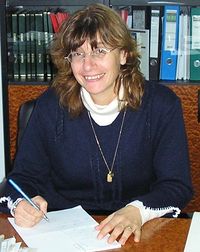|
Christiane El-Haddad started as an Intern to Cyprus Neuroscience and Technology Institute in 1993. She joined as part-time Research Associate between 1996 and 1998, when she left Cyprus. Since 2005, she collaborates as Visiting Research Associate.
Christiane pioneered in the early years of research on dyslexia and the creation of The Dyslexia Group, of which she was one of the very first members. Christiane served as the coordinating scientist for the development of the Mental Attributes Profiling System project which was funded by the Research Promotion Foundation) and co-organized several Yearly “Computers and Dyslexia” meetings (1996, 1997, 1998). Christiane has supported the organization and also particpated in the Innovation-Technology-Social Progress Fair. Her early research was on how fairy tales and puzzles can predict the sequencing ability of children, which was later shows to correlate to several learning attributes. She has presented this work in the 4th World Congress on Dyslexia.
Short bio
Christiane El-Haddad holds a BA in Psychology and various certificates in psychology and neuroscience. While in Cyprus she was an active member of the Cyprus Dyslexia Association.
Current activities
Christiane's current research work involves the study of children’s ability to express and recognize emotions and its role in learning.
Publications
Peered reviewed
- Haddad, C. and Laouris, Y. (2011). The ability of children with mild learning disabilities to encode emotions through facial expressions. In Towards Autonomous, adaptive and context-aware multimodal interfaces: Theoretical and Practical Issues. A. Esposito, Esposito, A.M., Martone, R., Müller, V.C., Scarpetta, G (Eds.): COST 2102 Int. Training School 2010, Lecture Notes In Artificial Intelligence Springer-Verlag, Berlin, Heidelberg 6456, 387-402.
- Laouris, Y. and Haddad, C. (2009). The ability of children with mild learning disabilities to encode emotions through facial expressions. In Esposito A. et al (Eds): Development of Multimodal Interfaces: Active Listening Synchrony. Berlin-Heidelberg: Springer.
Abstracts
- El-Haddad, C. & Laouris, Y. (1993). How does your brain manage your memory. Academic Poster Session on Memory and Learning - Human and Computer. The Philips College, Cyprus.
- Laouris, Y, & El-Haddad, C. (1993). The world of Dyslexia: A view from Inside. First Science and Innovation Fair. Cyprus.
- Laouris, Y, & El-Haddad, C. (1993). Dyslexia, is it related to intelligence, success or failure in life? First Science and Innovation Fair. Cyprus.
- Laouris, Y, & El-Haddad, C. (1993). Movement, Rhythm and Dyslexia. First Science and Innovation Fair. Cyprus.
- Stylianou S., Laouris, Y, & El-Haddad, C. (1993). Multimedia, A new tool to help the dyslexic. First Science and Innovation Fair. Cyprus.
- Laouris, Y., Minaidou, D., & El-Haddad, C. (1997). Computer interface for studying letter, word and pattern recognition strategies when interacting with computer screens. IEE CONF ABSTRACTS 1997 (Cyprus) Proc., p. 00.
- Laouris, Y., & El-Haddad, C. (1998). Preliminary results in assessing retention and learning attributes through the use of electronic story boards. 4th World Congress on Dyslexia (Halkidiki, Greece).
- El-Haddad, C., & Laouris, Y. (1999). Measurement and assessment using educational computer interfaces. Mediterranean Computer Using Educators' Conference, University of Cyprus, Jun 1999, Proceed., p. 00.
- El-Haddad, C. & Laouris, Y. (2005). Introducing the concept of “emotions” in school curricula; Technology-assisted recognition and mimicking of facial expressions in a team of elementary school children with mild learning disabilities. Proc. 3rd International Multilingualism and Dyslexia Conference: Multilingual and Cross-Cultural Perspectives on Dyslexia, Limassol, Cyprus, 2005.
- El-Haddad, C. and Laouris, Y. (2008). A new method to assess the ability of children to name (denomination) vs. express (mimic) facial expressions that correspond to specific emotions. Proc. Development of Multimodal Interfaces: Active Listening Synchrony , March 23-27, 2009, Trinity College, Dublin ( Ireland)
